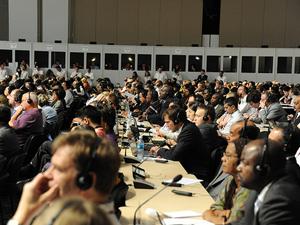Dickinson to Durban » Climate Change » We Will Figure it out Next Year
We Will Figure it out Next Year
The fact that the countries of the world come together every year for the Conference of the Parties (COP) to discuss and debate climate change is progress by itself. It is impressive that every year almost every nation sends delegate to this conference to confront together one of the largest challenges of our time in a peaceful manner. However, discussion is only the first step, and it seems that the global community is having a difficult time moving on to step two which is to take action. This struggle is reflected in most of the agreements that the COP comes to by the end of each conference. They restate what they agree on: climate change is occurring, and every nation needs to take some degree of responsibility for it. Then, when it is time to make a concrete commitment, countries shy away. The problem is that the Copenhagen Accord and the Cancun Agreement are simply that, agreements. It is in countries’ long-term interests to abide by the agreements, but they are not truly bound to them. Each year, the agreements that are made do not hurt climate negotiations, but classifying them as positive steps is too radical. Nations have established that they can voice their opinions about climate change, now they need to take sweeping actions to mitigate climate change because the clock is ticking.
In the Copenhagen Accord, countries recognized that “the increase in global temperatures should be below two degrees” to prevent climate change from having disastrous effects (Copenhagen Accord, 1). Further, they say that they will take action to mitigate climate change and put efforts towards adaptation because climate change is currently happening. In theory, the world’s problems have been solved; however, in reality nothing could be further from the truth. In the Climate Action Centre’s description of the conference they said that the Accord was not “fair, ambitious, [or] legally-binding,” and countless others have echoed this sentiment. The words do nothing if they are not carried out. There is no time to say that we can deal with this problem next year, yet that is what continues to happen.
In the blink of an eye, next year rolls around, and the COP at Cancun takes place. Again, the parties come to an agreement. But again, for the most part it is just talk. It does discuss the role of developing nations more in depth than prior meetings which is an important step. Additionally, “progress was made on several issues, such as finance and adaptation, [but] emission reduction pledges by individual counties did not change, and no global target was set” (Chen Claudine et al, 1). It is necessary for global emission to decrease radically in order to avoid dangerous anthropogenic warming, but nations refuse to commit to numbers which will help the global community achieve this goal. Although nations might be more successful in the short term due to this decision, in the long run, everyone is going to be in danger.
Unfortunately, neither of these conferences have had outstanding impacts on climate negotiations. Different interests of nations prevent agreement, and thus greatly reduce the possibility of slowing climate change. Looking forward, we can hope that stronger, legally-binding agreements will come to fruition in Durban, South Africa in November 2011, but predictions of the outcomes do not seem promising. Cooperation and sacrifice will be the keys to creating a comprehensive agreement which requires nations to abide by stringent emissions guidelines, but the question is, can the world today pull this off?
Work Cited:
Chen, Claudine, Bill Hare, Markus Hagemann, Nikias Hohne, Sara Moltmann, Michiel
Schaeffer, “Cancun Climate Talks- Keeping Options Open to Close the Gap.” 10 January 2011. http://www.climateactiontracker.org/briefing_paper_cancun.pdf.
Climate Action Centre. “A Climate Con – Analysis of the ‘Copenhagen Accord.’” Last Modified
December 21, 2009. http://www.climateactioncentre.org/climatecon.
UNFCCC. “Copenhagen Accord.” December 18, 2009.
Filed under: Climate Change · Tags: actions, Anna McGinn, Cancun Agreement, climate change, COP 15, COP16, Copenhagen Accord










Indeed, as we talked about in class today, and you have mentioned in your post here, the climate negotiations are iterative — meaning that the more times COP can come together, the more likely states are to cooperate. Professor Russ Bova discussed this “iterative” theory in his International Relations lecture, when he talked about “game theory.”
My one concern: when will it be too late to wait for continued iterative games? At what point will negotiators understand that big actions need to be taken as quickly as possible? I’m a bit too scared to wait for that answer.
I agree with you, Claire. It is quite scary that there is so much talk and so little action. I hope that will change in Durban, but realistically I do not think it will. If the COPs are not achieving enough, what is the next step?